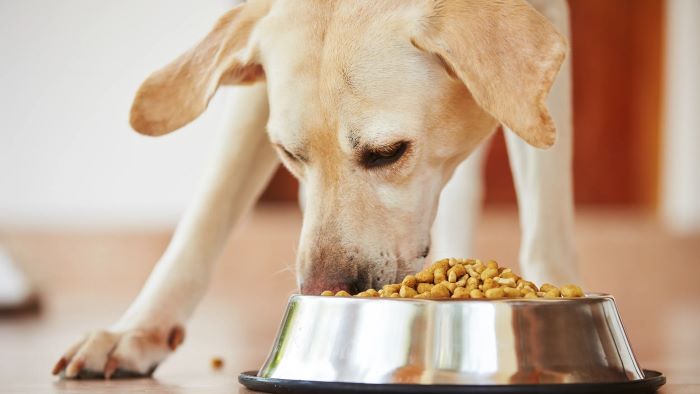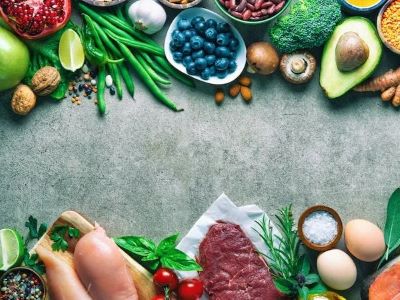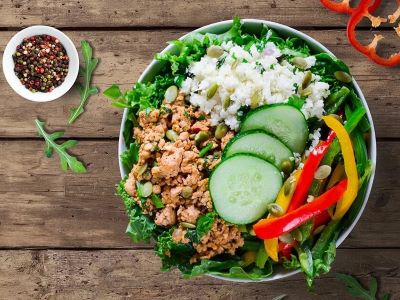If your dog is suffering from inflammatory bowel disease then, you might already be worried about his health. You might want to provide your dog with the best possible medical facilities and care. But is it enough?
Apart from the best medical facilities and care what your dog requires the most is good food. The food instead of leading to discomfort provides your dog relief from these existing illnesses.

Here in this blog, ‘What to feed a dog with inflammatory bowel disease?’ we will provide you with much-needed information related to the dietary requirements of your dog suffering from IBD.
What Is IBD and How Does It Affect Dogs?
IBD inflammatory bowel disease, is a condition affecting a dog’s white blood cells which occupy their intestinal tract[1]. Due to this reason, there is inflammation in the dog’s intestine, which further damages the dog’s intestine lining causing hindrance in the digestion process of the dog.
Due to this problem of indigestion, the dog’s body is unable to receive the complete nutrients which leads to weight loss, weakness and diarrhoea in dogs.
Though the real cause of IBD is unknown it is supposed to be caused due to either immune system disorder or due to food-related allergies. Intestinal bowel disease can be diagnosed by a vet through blood tests and if required a biopsy of the intestine.
Intestinal bowel diseases at an initial stage can be treated but if it is severe then it may require to be treated lifelong. The impact of this disease is long-term on your dog’s health.
What Are the Signs and Diagnosis of IBD in Dogs?

Here are some signs your dog might show if he is suffering from intestinal bowel disease IBD:
- Vomiting
- Weight loss
- Diarrhea
- Loss of appetite
In addition to gastrointestinal symptoms, dogs with IBD may also suffer from issues like hip dysplasia in dogs due to nutritional deficiencies over time.
IBD can be diagnosed in the following ways:
- Blood test: Through blood tests, the issues in the pancreas and liver can be identified. It helps to indicate the inflammation and level of infection in the dog’s body.
- Ultrasound: Through ultrasound, the vet is able to get a clear picture of the dog’s intestine and can identify the gastrointestinal problems.
- Intestinal biopsy: This is the best way to identify the intestinal bowel disease. Through intestinal biopsy, the vet knows the level of inflammation in a dog’s stomach lining.
As mentioned in webmd, "There is no cure for IBD, but the condition can be managed through prescription medication like antibiotics and steroids and changes in diet. Since each dog and their case of IBD is different, the condition can take some trial-and-error to find the right treatment plan."
How To Choose the Best Diet for Dogs With IBD?
Dog’s dietary requirements vary in terms of their size, breed and dietary requirements even if they are suffering from intestinal bowel disease.

Hypoallergenic diet:
A hypoallergenic diet consists of food free from food allergens. This diet is mainly based on a single animal diet and a single carbohydrate source. This diet does not trigger allergens in dogs.
You can serve your dog the homemade hypoallergenic diet[2] or even the packet-based hypoallergenic diet. This diet is easily digestible by dogs and thus does not lead to irritation.
High-fibre diet:
A high-fibre diet is a full fibre-rich diet. Fibre is nothing but carbohydrate that passes through the dog’s intestine without getting digested thus maintaining the dog’s bowel health and helping in reducing inflammation.
High fibre diet consists of pumpkin, sweet potato, oats and flaxseed. This helps in maintaining the dog’s gut health.
Plant-based diet:
Plant-based diet consist of only a plant diet. A dog’s body can easily digest the plant-based diet. As per a dog’s nutritional requirement, a plant-based diet should consist of vitamins, minerals, amino acids and fatty acids.
Probiotics:
Giving your dog probiotics can help reduce the inflammation in the stomach lining and maintain gut health. Probiotics are digestive supplements that improve the dog’s digestion process and help in absorbing the required nutrients.
Kefir is the best probiotic you can give a dog suffering from inflammation and bowel disease.
If you are still unable to choose the right diet for your dog suffering from IBD you can just consult your vet. The vet will be able to help you in a better way by suggesting a proper diet according to your dog’s requirements.
You can choose a diet that is low in protein, such as a low protein dog food, as high protein diets can be difficult for dogs with IBD to digest
Feeding a dog with IBD nutritious food can prevent issues like limping and joint pain. If your dog is limping, check our guide on how to treat a limping dog at home for more information.
Home-Prepared Diets for Dogs With IBD
If you are considering feeding your dog suffering from intestinal bowel disease IBD the home-prepared diet then it is the best thing to do. While preparing the home-prepared diet make sure you follow the above-mentioned ‘How To Choose the Best Diet for Dogs With IBD?’ instructions.

Here are some examples of home-prepared diets for dogs:
- Tilapia and sweet potato: This diet is made of tilapia, sweet potato, eggshells, iodized salt, broccoli stalks and pumpkin. It is rich in protein, omega-3, and fatty acids.
- Pork and barley diet: This diet consists of pork, barley green beans, pumpkin, and eggshells. It is rich in protein, fibre, Vitamin B and iron.
- Turkey and rice diet: It is made of cooked turkey breast, brown rice, carrots, spinach, eggshells, and iodized salt.
If you are changing your dog’s diet completely or are about to introduce new food to their diet then don’t change it directly. You should start by slowly introducing a new food, to check if it suits your dog or not. For example, some owners ask "can dogs eat sweetcorn?" when considering adding vegetables
What Are Some Tips and Precautions for Feeding Dogs With IBD?
While you decide to feed your dog the diet suitable for the intestinal bowel disease. Here are some tips and precautions you can follow for feeding your dogs:
- If you are changing your dog’s diet completely or are about to introduce new food to their diet then don’t change it directly. You should start by slowly introducing a new food, to check if it suits your dog or not.
- Make a note of the food that suits your dog’s diet perfectly, so you know what food to feed your dog and what not to.
- Avoid feeding your dog food with salt, sugar or spices as it will lead to more trouble for your dog’s health.
- Before making any changes in your dog’s regular diet consult a vet.
Be mindful of your dog's age and life stage when choosing food. For example, some wonder - can adult dogs eat puppy food? Generally it's best to feed adult dogs adult dog food rather than puppy food.
Home Remedies
Turmeric works tremendously. Turmeric has powerful anti-inflammatory, antioxidant, and antimicrobial properties. The anti-inflammatory effect is also beneficial for dogs with gastrointestinal disorders, such as inflammatory bowel disease (IBD).
Turmeric’s antibacterial properties can help our dogs maintain gut health by addressing bad bacteria while allowing good bacteria to flourish. Turmeric works tremendously for reducing inflammation. You can find turmeric for dogs uk that is specifically formulated as a supplement.
Specifically, turmeric reduces inflammation in intestinal tissue, alleviating damage to the gut lining. Eases gastrointestinal symptoms like diarrhoea and vomiting. Aids healing of lesions or ulcers in the digestive tract.
The anti-inflammatory and healing effects of turmeric make it a versatile supplement for managing IBD.
FAQs
What foods make IBD worse?
The food which is hard to digest makes IBD worse. Chicken, wheat, beef, etc are some food which are not easy and takes longer time to digest completely. If your dog is suffering from IBD, avoid giving your dog food with high protein as it will only worsen the situation.
What to feed a dog with inflammatory bowel disease?
If your dog is suffering from inflammatory bowel disease, then try feeding him food which is hypoallergenic, rich in diet, and mostly plant-based diet. Avoid feeding your dog food high in fat, protein, sugar or spices as this food can cause irritation in your dog’s digestive system.
What foods reduce bowel inflammation?
Foods which have high antioxidants, and fibres and possess anti-inflammatory compound reduces bowel inflammation. Blueberries, pumpkin and veggies low in fibre should be given to dogs suffering from inflammatory bowel diseases as they give them relief from the existing stomach irritation.
What fruit is ok for IBD?
The fruits with anti-inflammatory properties are good and suitable for dogs. Fruits like blueberries, cranberries, coconut, and papaya are the ideal choices for dogs suffering from Inflammatory bowel diseases. These fruits without irritating the dog’s bowel movement help the food digest and soothe their stomach.
Is yoghurt good for dogs with IBD?
No, yoghurt is not good for dogs with inflammatory bowel disease. As it contains lactose and casein it can be hard to digest for dogs. Feeding yoghurt to a dog suffering from inflammatory bowel disease will only worsen it and lead to irritation and more severe health complications.
Conclusion
Inflammatory bowel disease is a lifelong illness, it cannot be cured fully. In this situation, it is necessary to provide your dog with a diet which soothes the effect of IBD instead of making it worse.
We hope that the blog, ‘What To Feed a Dog With Inflammatory Bowel Disease?’ will help you choose the right diet for your dog which helps him deal with this lifelong illness.
Reference:
- Digestive system of the dog. (2022, March 10). Veterinary Teaching Hospital.
- 21 CFR § 105.62 – Hypoallergenic foods. (n.d.). LII / Legal Information Institute.



